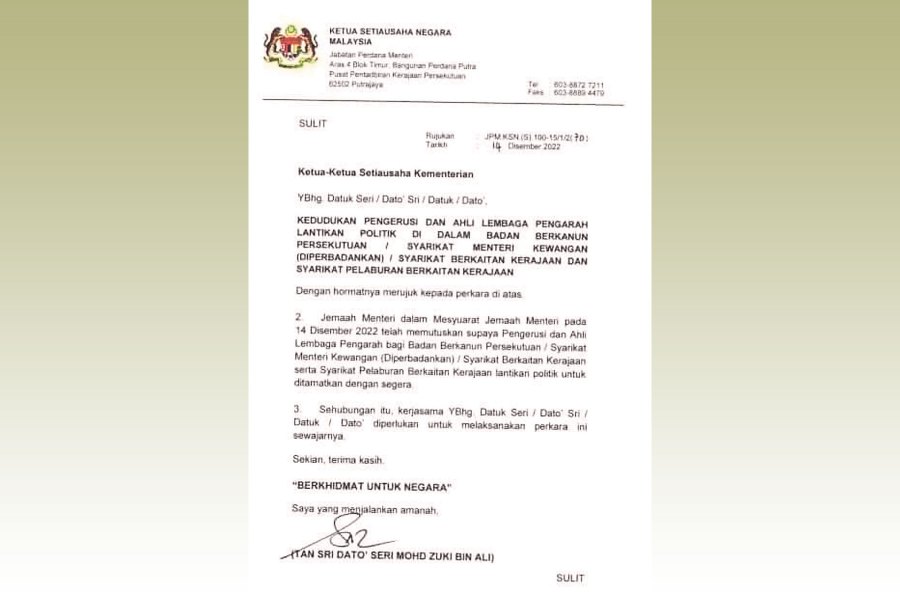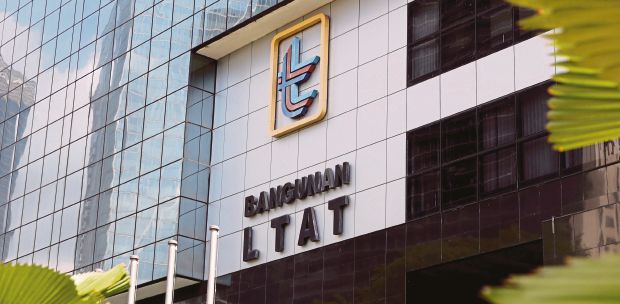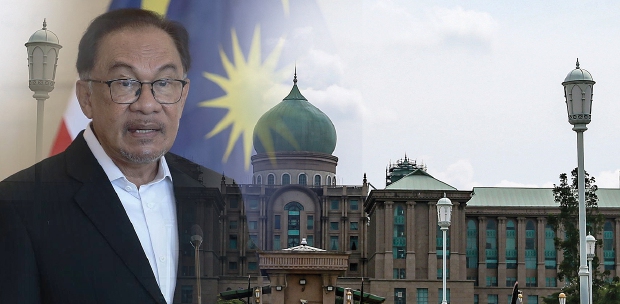All political appointees and directors in federal statutory bodies, Ministry of Finance (Inc) firms, government-linked corporations (GLCs), and government-linked investment companies (GLICs) had their services terminated effective yesterday.
It is learnt that Chief Secretary to the Government Tan Sri Mohd Zuki Ali had issued letters to the appointees to inform them of the matter.
A copy of the letter sighted by the New Straits Times stated that the decision was made in accordance with the cabinet meeting on Wednesday.
"Ministers in the cabinet meeting on Dec 14 decided that chairmen and directors on the boards of federal statutory bodies, Ministry of Finance (Inc) companies, government-linked companies and government-linked investment companies who were political appointment will be terminated effective immediately," the letter said.
It is understood this involved some 140 political appointees in 39 organisations, including the Federal Land Development Authority, Federal Agricultural Marketing Authority, Tenaga Nasional Bhd, Malaysian Palm Oil Board and Majlis Amanah Rakyat.
Checks with some of the GLCs in question showed that none have received the letters.
The move appears to be a part of Prime Minister Datuk Seri Anwar Ibrahim's sweeping changes to the administration.
Anwar previously announced some shake-ups in the government, including ending the practice of rewarding members of parliament with cabinet positions in exchange for their support.
The practice of appointing special envoys, he said, would be considered only when absolutely required.
Experts believe the move should be seen as a golden opportunity for the government to do away with the decades-old system of placing politicians in such organisations.
They believe the current administration should use this chance to appoint professionals and technocrats to key positions.
Putra Business School economic analyst Associate Professor Dr Ahmed Razman Abdul Latif said the decision was timely as the Finance Ministry earlier this year issued a guideline and recommendation against political appointments in GLCs.
He said ending this practice could improve Malaysia's global Corruption Perception Index ranking.
"The timing of this is apt. It's high time the practice is put to a stop. It has been going on for far too long.
"Appointments must be made on merit alone and the individuals must be competent and professional in helming their position."
He said political appointments increased the risk of abuse of power, incompetency and corruption.
"These appointees outweigh the benefit of political expediency in the organisation. I have yet to see any successful corporate stories coming from a politician."
He said terminating political appointees' services should extend to public higher learning institutions and special envoys.
"Public universities should be apolitical. The appointments of top leaders in universities must solely come from the recommendation of the Academy of Higher Education Leadership.
"Special envoys should be reserved for diplomatic service officers or high-ranking government officials because they know all the protocols and have built good networks during their service, unlike politicians who come and go."
Centre to Combat Corruption and Cronyism executive director Cynthia Gabriel said removing political appointees from federal statutory bodies and government-linked entities will pave the way for stamping out political interference in the public service.
However, she said, the government must lay out follow-up measures to promote better integrity, transparency and accountability in these entities.
"The government has to ensure transparency in the new appointments that they approve for these top jobs. They should clearly lay out their plans to improve integrity in government-linked bodies so that anti-graft watchdogs can also share their views on it."
Transparency International-Malaysia president Dr Muhammad Mohan said this move was in line with what civil societies had demanded from previous governments.
"Political appointments are given as a reward for political support to keep a government stable.
"However, it opens the risk for corruption, where funds are channelled to political parties as there are no laws against this."
He said technocrats and professionals should be appointed to top positions, not politicians.
"This is an excellent opportunity to appoint technocrats and professionals, as Malaysia has plenty of them. Their appointment will reduce corruption and misuse of power, especially in GLCs and GLICs."
He said the terminations should include special envoys and positions in higher learning institutions, adding that plans should be in place to allow the organisations to operate and transition smoothly.





